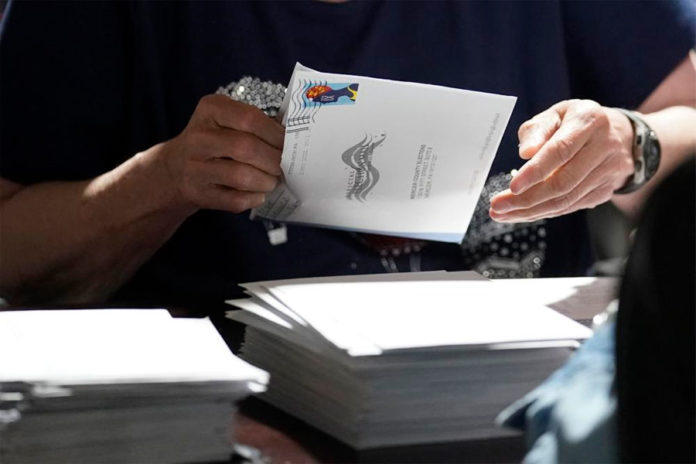
PHILADELPHIA (AP) — A federal appeals court must decide if Pennsylvania voters need to put accurate handwritten dates on the outside envelopes of their mail-in ballots for the votes to count, a dispute with implications for this year’s presidential contest.
The 3rd U.S. Circuit Court of Appeals held oral arguments in Philadelphia Tuesday over a district judge’s ruling in November that even without the proper dates, mail-in ballots should be counted if they are received in time.
Ari Savitzky, a lawyer with the American Civil Liberties Union representing several voter groups, told the court that more than 10,000 ballots in Pennsylvania were disqualified in 2022 based on what he called “a meaningless paperwork error.” He argued that the “materiality provision” of the 1964 Civil Rights Act was designed to prevent that.
“An immaterial mistake on a piece of paperwork doesn’t go to the deficiency or validity of the ballot itself,” he argued before the three-judge panel.
U.S. Circuit Judge Cindy K. Chung, who was appointed to the bench by President Joe Biden, asked where judges should draw the line between meaningless and material errors that can render the ballots invalid.
“Is there a difference between non-compliance — where you totally leave off the date — and imperfect compliance, where you have the date but you got the year wrong?” she asked.
Lawyer John M. Gore, representing state and national Republican groups challenging a district court ruling last year, said “the right to vote is not denied” when the state qualifies someone to vote, sends them a ballot and then rejects the ballot “because they failed to follow Pennsylvania law.”
In Pennsylvania, Democrats have been far more likely to vote by mail than Republicans under an expansion of mail-in ballots enacted in 2019. Republican lawmakers agreed to the change in exchange for an end to “straight-party voting” that they saw as a longtime Democratic advantage. In 2022, about 1.2 million Pennsylvanians voted by mail.
When the COVID-19 pandemic began, the consequences of the expanded mail-in ballot rules became more pronounced, and the partisan vote-by-mail gap was widened by President Donald Trump’s opposition to mail-in ballots during his failed 2020 reelection campaign.
U.S. District Judge Susan Paradise Baxter, a Trump appointee, ruled last year that county boards of election may no longer reject mail ballots that lack accurate, handwritten dates on their return envelopes. She said the date — mandated by state law — is irrelevant in helping elections officials decide whether the ballot was received in time or whether the voter is qualified to cast a ballot.
The Pennsylvania groups challenging the date mandate argue it allows the state to disenfranchise voter over meaningless mistakes, violating provisions of the U.S. Civil Rights Act of 1964. The suit was filed by state chapters of the NAACP, the League of Women Voters, Common Cause, the Black Political Empowerment Project and other groups.
Baxter said elections officials do not use the date on the outer envelope to determine whether the vote should be counted.
“The important date for casting the ballot is the date the ballot is received. Here, the date on the outside envelope was not used by any of the county boards to determine when a voter’s mail ballot was received in the November 2022 election,” Baxter wrote.






